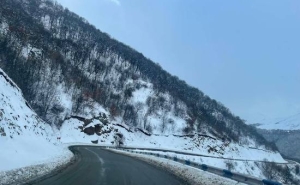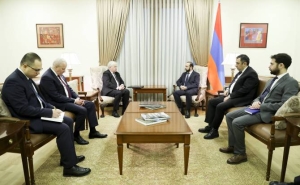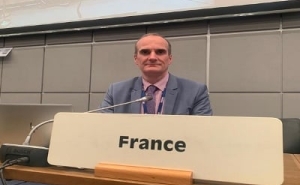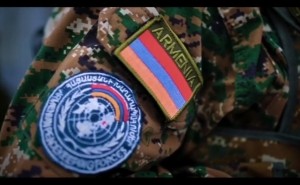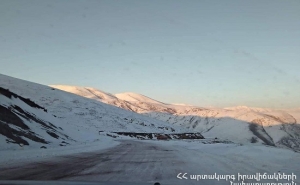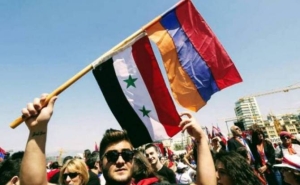"Ohanyan-Raffi-Oskanyan" Alliance and Their Foreign Policy Priorities: Interview with Armen Martirosyan (EXCLUSIVE)

Parliamentary elections are also a choice of the foreign policy course of the country. One of the priorities of "Armedia" IAA is the coverage and analysis of the foreign policy of the Republic of Armenia. On the eve of parliamentary elections scheduled for April 2, "Armedia" IAA conducts interviews with the representatives of all nine political forces giving them the same questions, which will allow our readers to better understand the approaches of the political forces regarding the foreign policy priorities of Armenia.
"Armedia’’ IAA presents an exclusive interview with the member of the "Ohanyan-Raffi-Oskanyan" alliance, Armen Martirosyan.
-Will you, please, name the three main priorities of the foreign policy directions of your political power?
- Sovereignty, increased subjectivity and balanced policy of Armenia.
- What is your position on Karabakh conflict settlement process?
- Recognition of the independence of the Nagorno-Karabakh Republic. The return of Karabakh to the negotiation table, as well as the protection of the security of the Nagorno-Karabakh Republic.
- Do you consider it possible to restore the Armenian-Turkish relations in the near future? What is the key to progress in this direction? And what steps should be taken for the international recognition of the Armenian Genocide?
-I have a positive attitude towards the restoration of relations without any preconditions, but at the moment I do not see this possibility, because the Turks do not give up their preconditions, and the Armenian side has no right to restore relations with preconditions. A strong state guarantees the restoration of the Armenian-Turkish relations and the readiness to establish relations with Turkey without preconditions.
As for the recognition of the Genocide, we saw that many countries of the world recognized the Genocide, when Armenia was strong and consistent (in this matter). Now, obviously, the situation is not the same, and the Armenian-Turkish protocols, in particular, prevented this. In case of our coming to power, I do not rule out that the states will continue to recognize the Armenian Genocide.
- What is your approach towards Armenia’s integration processes? How do you see the development of Armenia's bilateral relations with the US, the Russian Federation and with individual European countries?
- In foreign policy, the most important task for us is to conduct a balanced, multi-vector policy. Mutual relations with our Russian ally will be continued. With the West, namely the United States and Europe, real, deep relations will be established. And we do not mean the grants that arrive in Armenia and do not give anything.
- How do you see the development of the relations of the RA with the neighboring countries, particularly with Iran and Georgia? What steps are needed in this direction?
- We attach great importance to deepening our relations with Georgia and Iran. Georgia is our natural partner, and we need to bring this naturalness by bilateral agreements to such an extent that there are no problems in relations with Georgia. And with Iran we also should have good relations in economic and political, including strategic fields.
Both states are our natural allies, and that explains everything. We must make every effort to make these relations really deep. Sovereign Armenia can establish very effective political and economic relations with two neighboring countries.
- What are your political force’s views on regional security issues?
- It is true that our region is highly variable, and we see a variety of processes which are moving towards Armenia at a very rapid pace. In order to promote regional security, first of all, countries should be democratic, which is not the case though. Both Azerbaijan and Turkey, in fact, have become authoritarian states. Naturally, this represents a certain danger. Therefore, we must maintain our security both independently and through various allied and contractual relations, including bilateral ones.
- How do you see the development of the Armenia-Diaspora cooperation? What should be the priorities of the overall agenda of this relationship?
- The priority of the common agenda should be unity. We consider important not only the investments that can be contributed by Diaspora to Armenia, but also Diaspora’s participation in the decision-making mechanism in our country, the opportunity to be represented in it by professional staff. Relationships should be really deep, not just declarative.
- What is your approach towards the processes taking place in the Middle East and the policy of Armenia towards them?
- At the moment I do not think that Armenia can implement any policy there. In the Middle East Armenia can pursue only a policy related to the protection of the Armenian population, if it can ensure its interests and if it can economically be so strong as to participate in these processes.
Other materials on this subject
- RA President: Armenia Has No Longer Individual-Centered Government Our people witnessed the advantage of it, after the election, when for the first time in the history people did not gather and say they would make a revolution.
- The New Parliament Will Carry Out Multi-Vector and Balanced Foreign Policy In regard with Karabakh conflict, the new Parliament will have a joint approach – to resolve the conflict through peaceful negotiations. Nevertheless, in the approaches of the 4 political forces there...
- Post-Election Armenia: Changes Are Recorded in the Political Culture These elections were obsereved by an unprecedented number of observers, including both international observers and local ones, as well as our compatriots from Diaspora. This means that more representatives...
- Only 1.65% of the Armenian Voters Expressed Themselves in Favor of Great Concessions on Karabakh Issue It should be mentioned that the least votes received the approach adopted by "Congress-PPA" party, which supposed great concessions. Instead, the voters supported the settlement of the conflict with negotiations...
- What Relations with the Diaspora Did the RA Citizens Choose? Armenian Revolutionary Federation, which received 103,48 votes, thinks that the Armenian Diaspora should be fully integrated in the development of Armenian statehood.
-
 17:08
17:08The regular session of the Anti-corruption Policy Council takes place in Jermuk
-
 15:05
15:05The Prime Minister sends congratulatory messages to the supreme leader of Iran and the President of Iran
-
 11:11
11:11Armenia sends earthquake aid to Turkey
-
 10:43
10:43Commemoration of the Pontiff St. Sahak Partev
-
 09:16
09:16Some roads are closed and difficult to pass in Armenia
-
 19:55
19:55Phone conversation of the Foreign Minister of Armenia with the U.S. Assistant Secretary of State for European and Eurasian Affairs
-
 18:30
18:30Prime Minister Pashinyan and President Khachaturyan meet
-
 18:20
18:20Ararat Mirzoyan with Co-Chairman of the OSCE Minsk Group of France Brice Roquefeuil
-
 17:01
17:01Humans could land on Mars within 10 years, Musk predicts
-
 16:45
16:45France, US urge 'immediate' end to Nagorno Karabakh blockade
-
 16:01
16:01Blockaded Nagorno Karabakh launches fundraiser to support quake-hit Syria
-
 15:59
15:59Earthquake death toll in Turkey rises to 18,342
-
 15:43
15:43Ararat Mirzoyan Held a Telephone Conversation with Sergey Lavrov
-
 15:06
15:06French president rules out fighter jet supplies to Ukraine in near future
-
 14:47
14:475 Day Weather Forecast in Armenia
-
 14:44
14:44President Vahagn Khachaturyan wrote a note in the book of condolences opened in the Embassy of Syria in Armenia
-
 14:20
14:20Azerbaijan’s provocations impede establishment of peace and stability – Armenian FM tells Russian Co-Chair of OSCE MG
-
 12:57
12:57France representation to OSCE: Paris calls on Azerbaijan to restore freedom of movement through Lachin corridor
-
 11:40
11:40Command of Kosovo forces highly appreciated preparation of Armenian peacekeepers
-
 10:16
10:16The United States withdrew from sanctions against Syria for six months the provision of assistance after the earthquake
day
week
month
Humidity: %
Wind: km/h


